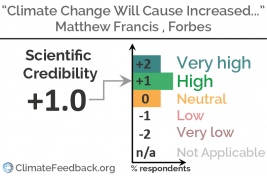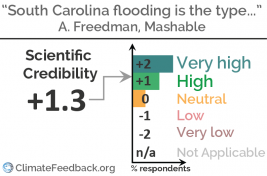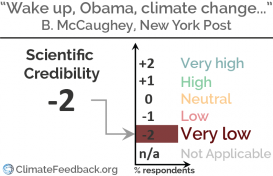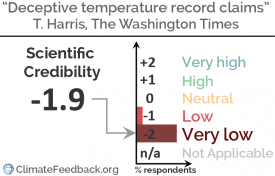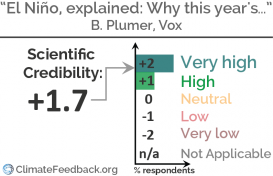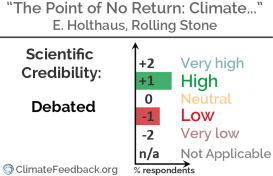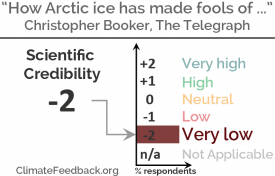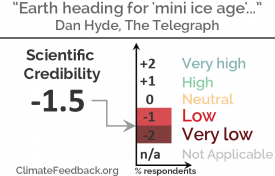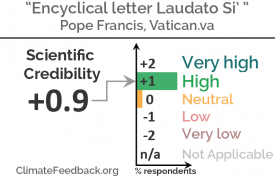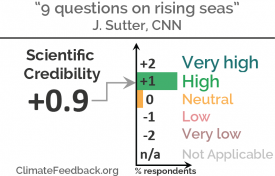Article Reviews
“Is this article consistent with the latest thinking and knowledge in science?”
“Would experts in this field endorse the main message of this article?”
These are the types of questions our “feedbacks” are designed to answer. If the feedback is positive, you can generally assume the information you’re reading is of high credibility. If it’s negative, however, you may want to read with extra care and attention — some of the information contained and conclusions reached are not consistent with science.[1]
Analysis of “Climate Change Will Cause Increased Flooding In Coastal Cities ”
in Forbes, by Matthew Francis
"The article discusses a manuscript that is still under "open access" review, so naturally there is still significant (and public) discussion about the details among scientific reviewers. Overall the article is accurate, [...] and it correctly states that sea level rise is a real problem regardless of this particular Hansen publication."
— 25 Oct 2015
Analysis of “South Carolina flooding is the type of event climate scientists have warned about for years”
in Mashable, by Andrew Freedman
"It's tricky to evaluate the contribution of climate change to a particular weather event, but generally speaking, the author provides an accurate summary of the challenges of this research, and the range of scientific thinking about it."
— 10 Oct 2015
Analysis of “Wake up, Obama, climate change has been happening forever”
in New York Post, by Betsy McCaughey
"the evidence of accelerating glacier melt and retreat in response to manmade warming is crystal clear. Any other conclusion is willfully ignoring the data, the facts, and the conclusions of the entire glaciological community."
— 10 Sep 2015
Analysis of “Deceptive temperature record claims”
in The Washington Times, by Tom Harris
"Scientists unanimously qualify this article as misleading and in disagreement with elementary science."
— 28 Aug 2015
Analysis of “El Niño, explained: Why this year’s could be one of the strongest on record”
in Vox, by Brad Plumer
"This is a great article on the current El Niño and explainer on how El Niños often affect global climate, as well as regional climates around the world... A nice explainer from Vox."
— 21 Aug 2015
Analysis of “The Point of No Return: Climate Change Nightmares Are Already Here”
in Rolling Stone, by Eric Holthaus
"The article rightly communicates the urgency and seriousness of human-induced climate change, [...] However, by the title, subtitle, and overall framing, it is likely to give an impression that some current events can be attributed to human influence for which the scientific evidence supporting such an attribution is either weak or non-existent."
— 12 Aug 2015
Analysis of “How Arctic ice has made fools of all those poor warmists”
in The Telegraph, by Christopher Booker
"This "take" on Arctic sea-ice changes, and more generally polar ice evolution, is highly inaccurate and totally misleading. The authors goes to great lengths to try to convince readers that polar ice is doing just fine..."
— 31 Jul 2015
Analysis of “Earth heading for ‘mini ice age’ within 15 years”
in The Telegraph, by Dan Hyde
"The whole argument in the article rests on the incorrect myth that the Maunder minimum caused a "mini ice age" and uses that name to draw specious implications and conclusions."
— 30 Jul 2015
Analysis* of Pope Francis’ Encyclical Laudato Si
in Vatican.va, by Pope Francis
"The evidence presented in support of the anthropogenic footprint of environmental problems in general and climate change in particular was overall accurate and relevant. "
— 22 Jun 2015
Analysis of “9 questions on rising seas”
in CNN, by John Sutter
"This article does a very good job at presenting the main aspects of sea level rise and how it will impact coastal regions..."
— 12 May 2015
[1] Note: These feedbacks do not constitute endorsements of the author’s political or economic ideology, rather they are assessments of the scientific foundations and reasoning of the argumentation contained within each article.

